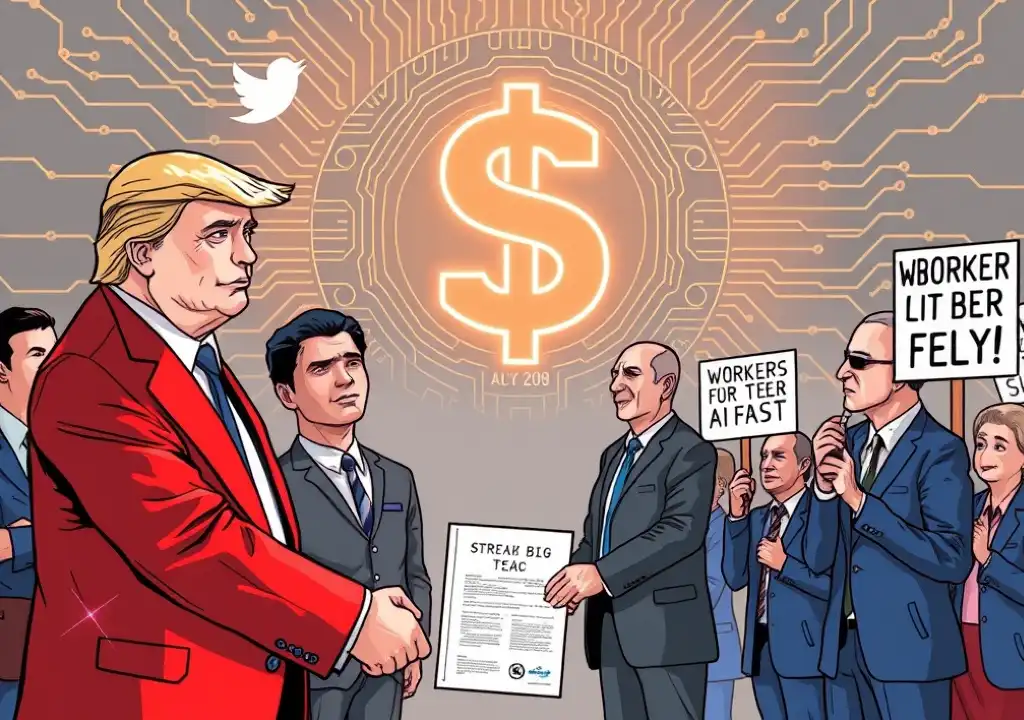As major tech figures gravitate toward US President Donald Trump, Democrats must redefine their approach to Big Tech.
President Donald Trump appears to have struck a chord with prominent tech billionaires. Elon Musk, Mark Zuckerberg, Jeff Bezos, and Google CEO Sundar Pichai were among those who attended his inauguration. OpenAI CEO Sam Altman has also voiced support, praising Trump’s proposed $500bn AI investment.
This seeming alliance marks a shift, as tech executives historically leaned Democratic. That may be changing due to Biden-era Democratic policies targeting Big Tech through antitrust action and critiques of billionaires. Now, tech moguls may prefer a Republican leader offering tax cuts, anti-union stances, big contracts, and deregulation.
Zephyr Teachout, a law professor at Fordham, argues Big Tech wasn’t ever truly with Democrats but aligned with influence. “Tech leaders were never ours. They’ve always aligned with power,” Teachout says. “Under Obama, Google deeply embedded itself in the administration, giving the illusion that tech supported Democratic ideals.”
The Intercept reported in 2016 that Google offered Obama’s team tech help, policy advice, and even staff, highlighting their close ties. Nathan Schneider, media professor at the University of Colorado Boulder, adds that executives often shift allegiance with political tides and employee pressure also plays a role.
After Trump’s 2016 win, employee uprisings within major tech companies emerged, pushing back against military contracts and authoritarian regimes. Musk’s Twitter acquisition, and his crackdowns on worker protections, paved the way for other CEOs to act similarly. Trump’s return represents further alignment with anti-labor policies.
During Biden’s presidency, unionization and employee activism rose, targeting questionable corporate practices. Musk, known for opposing unions, kept his companies union-free. With Trump, CEOs expect fewer regulatory obstacles and fewer internal revolts.
But this closeness to Trump could be risky. He is notorious for dropping allies the moment they become inconvenient. Mark Lemley, a Stanford law professor, warns: “He’ll support you until you no longer serve him. Trump’s loyalty is fleeting.”
Trump’s history of dismissing close allies — from Steve Bannon to Anthony Scaramucci — suggests tech CEOs shouldn’t feel secure. His reality TV catchphrase “You’re fired” may well apply to them too.
Democrats’ Path Forward
With the political landscape shifting, Democrats face a critical choice: stay the course on antitrust and billionaire taxes, or soften their stance to regain Big Tech’s favor?
Teachout argues Democrats should double down on fighting for workers, small businesses, and communities, not powerful intermediaries. “Democrats should be the party of small ‘d’ democracy, and that doesn’t coexist with massive monopolies,” she insists.
She believes the party must present a clear plan to regulate Big Tech, break up monopolies, and challenge threats to equality, innovation, and democracy.
Schneider agrees but emphasizes a shift from top-down to bottom-up tech reform. Empowering communities, not corporations, should be the goal, he says. That includes enforcing interoperability and funding public, open-source alternatives — especially in AI.
Projects like Bluesky, designed to be open and user-centric, show how left-leaning tech communities may chart their own paths apart from billionaire-controlled platforms.
Lemley notes Democrats may not achieve major policy goals while Republicans hold Congress. However, they can shape public discourse. Growing discontent toward Big Tech gives Democrats an opening to rally popular support.
A January 24 poll by AP-NORC showed most Americans oppose billionaire influence over government policy, indicating an appetite for change.
While it’s unclear if this Democrat–Big Tech breakup is permanent, many within the party seem prepared. Social media algorithms have not helped their cause — and newer, more ethical tech players may eventually align with them.
Lemley concludes: “Startups may find common ground with Democrats eventually — on issues like immigration, education, or science. Trump isn’t built to foster long-term innovation or global competitiveness.”

